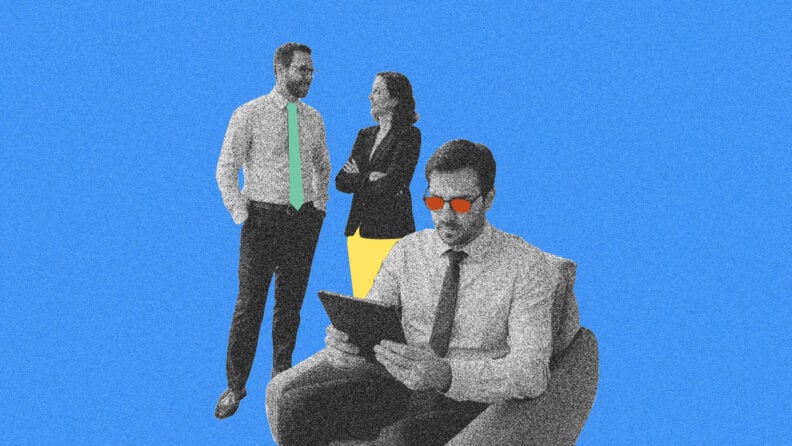We built People Managing People to serve HR leaders. For years, that mission was clear. But lately, something has become obvious to us.
Every conversation we have with HR leaders eventually circles back to the same frustration: their organizations are chasing efficiency gains and short-term cost reductions, while giving far less consideration to long-term planning or the impact on the people who built the business into what it is today.
The problem isn't that HR leaders lack influence. It's that the people making the biggest decisions about work, the ones that will ripple through organizations for decades, often don't see those decisions as being about people at all. They see them as technology decisions. Efficiency decisions. Competitive necessity.
When the Whole C-Suite Needs to Think Like HR
We've watched brilliant HR leaders burn out trying to be the sole conscience of their organizations. Meanwhile, CEOs are greenlighting automation strategies without fully understanding the human or operational cost. COOs are redesigning workflows as if people are infinitely adaptable components and CTOs are choosing between tools based on capability matrices that never mention the word "human" once.
It's not malicious. It's just that most of the C-suite has never had to think deeply about what happens to people when systems change. That's always been HR's job.
But when AI is woven into every function, every process, every decision, there is no separating the technology conversation from the people conversation anymore. The integration is the strategy. And if only one person at the leadership table understands the human side of that equation, your strategy has a blind spot the size of your entire workforce.
What We're Building Now
So we're doing something different. We're expanding beyond HR to create a space where the more of the C-suite can grapple with what it actually means to lead through this transformation.
For CEOs navigating the tension between competitive pressure and human responsibility, we'll explore how to make automation decisions that don't hollow out your organization's capabilities or culture.
For COOs redesigning work itself, we'll examine what operational excellence looks like when your workforce is a hybrid of human judgment and machine efficiency.
Not surface-level "change management" content. Not another podcast about the future of work that stays safely theoretical.
We're talking about the hard operational questions that leaders are losing sleep over:
- How do you redesign roles when you can't predict what skills will matter in eighteen months?
- What do you tell your team when half of them believe AI will make them obsolete?
- How do you maintain culture when the nature of collaboration is fundamentally shifting?
How We're Evolving
How we create and deliver content is changing to meet this moment:
Our software coverage is getting sharper. Instead of surface-level reviews, we're examining AI tools against real organizational challenges. We want to know, does this platform actually deliver on its promises?
Our articles are being rebuilt from the ground up. Whether it's a tactical playbook, a conceptual explainer, or our take on emerging issues, our content will be architected around the AI challenges you're actually facing. We’re not looking to provide generic advice, we recognize that your context is complex and your decisions have consequences.
Our podcasts are breaking the interview format. Some issues demand multiple perspectives in conversation with each other. Others need us to go deep with a single leader for an hour. We'll match the format to what the topic requires and prioritize actionable insight over polished soundbites.
Our events are becoming laboratories. Think fewer panel discussions where everyone agrees with each other. We're creating spaces for show-and-tells where leaders share what's actually working, hot seats where we pressure-test strategies in real time, and intimate podcast recordings where a small audience gets to shape the conversation. Because we aim to create events designed around what you need to learn, not what's easy to produce.
What You Get (And What You'll Need)
To access all of this, the full article library, software assessments, research reports, frameworks, event registration, and podcast archives, you'll need to join our free community. This is NOT a paywall.
Without an account, you'll hit a limit of 3 articles per month. With one, everything opens up. Event registration becomes one-click instead of filling out forms every time. Resources and downloads are immediately available. You're in the community, not just observing from the outside.
This isn't about creating friction. It's about building a community of leaders who are serious about these questions. The ones who recognize that stewarding people through the most significant technological transformation in over a century isn't a side project, it's the work.
If you've read this far, you've already recognized what's at stake. You've probably already been the person in the room raising concerns about what this means for people. Or maybe you're the CEO or COO who's realized that your smartest technology decisions keep creating people problems you didn't anticipate.
The next few years of decisions about AI and work will define what kind of organizations we build, what kind of economy we create, and ultimately, what kind of society we become.
This is the moment to make People Managing People a cornerstone of how you lead through it.

